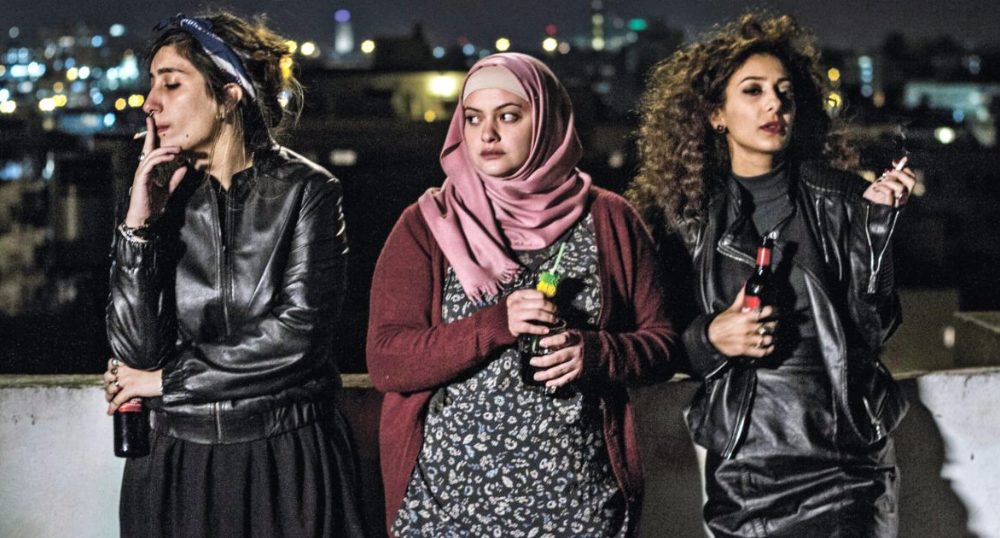
IN BETWEEN (Bar Bahar)
Film Movement
Director: Maysaloun Hamoud
Screenwriter: Maysaloun Hamoud
Cast: Mouna Hawa, Shaden Kanboura, Sana Jammalieh, Shaden Kanboura, Mahmoud Shalaby, Henry Andrawes, Aiman Daw, Riyad Sliman, Ashlam Canaan
Screened at: Critics’ link, NYC, 1/3/18
Opens: January 5, 2018
Watching this wonderful, beautifully crafted film, one without a single flawed performance, I couldn’t help thinking this: that secretly, sophisticated Israeli Arabs living in the solidly urban, free environment of Tel Aviv, are not too eager for an independent Palestinian state ruled by Arabs. This sounds like blasphemy, but consider this: that Israel, even under its present right-wing government, allows pretty much the freedoms that we in the States enjoy. The Israeli state protects everyone, Jews, Christians and Muslims alike, from incursions by outside, ultra-conservative Arabs, even by ISIS which dares not to with try with Israel what it has already done to Syria. At worst, Sharia law could be imposed on the West Bank and Gaza, which may be in the interests of people who want a state allegedly bound by Koranic law.
So how does “In Between” help lead to this conclusion? While Palestinians living in the villages, in West Bank, in Gaza, seem not to be changing their cultural views, those in urban centers are like nothing you’d imagine from what you hear from the media. Two of the principals, Laila (Mouna Hawa) and Salma (Sana Jammelieh) are as hip as the hippest New Yorkers. Laila is a high-powered attorney who smokes constantly, indulging in coke and liquor while doing the club scene. Salma is a lesbian, Laila’s roommate, who works as a bartender, sporting a large tattoo and a nose ring. Nur (Shaden Kanboura), a temporary roommate, is the kind of Palestinian Arab familiar to most of us here. She covers her head, she prays regularly, and like both her new pals has problems with men; who wouldn’t? Maysaloun Hamoud, the Budapest-born writer and director who currently lives in Jaffa, interprets their behavior not as stock figures as a lesser filmmaker might, but as people who are both representatives of their culture and separate individuals in their own right. Had she made them merely symbolic, her film would not have been so completely absorbing.
The men, though, are not so special. They are victims of their upbringing. Ziad (Mahmoud Shalaby), for example, has been hanging with Laila, a gent who comes across not quite as freewheeling as his attorney friend, though it takes some time for Laila to see the man’s true self. Wissam (Henry Andrawes) promises Nur the world: a car that she could use to drive to her university where she is studying computer science. But he is deeply flawed. Though criticizing Nur for rooming with two women he considers impure, and demanding that Nur stay at home and not work following their impending marriage, he twice departs from the principles of his Muslim faith that he so glibly upholds.
In a way Nur is the most interesting of the four major women, the fourth being Dounia (Ashlam Canaan), who becomes Salma’s love interest. Unlike the men who in different ways indulge in hypocrisy, she is changing, under the influence of the more progressive women who have taken her under their wing. When Nur is physically attacked by her fiancé, she gets revenge on the scuzzy hypocrite. In another situation, Salma comes under the harsh, uncalled for punishment of her parents who appear to be clueless that their daughter prefers the sexual delights of her own gender.
The story flows along exquisitely, its impressive shots including the scene at the clubs, places that Palestinians living outside urban centers like Tel Aviv, Jaffa, and even Haifa are only vaguely aware. While director Hamoud evokes stellar performances from her all-Palestinian cast (including a few who are Arab Christians), progressive Israeli Jews will have no problem embracing their culture which appears so much like their own. However conservative Jews and Palestinians alike will likely could be embarrassed and alarmed that “In Between” evokes a life-style that is anathema to their own.
Unrated. 102 minutes. © 2018 by Harvey Karten, Member, New York Film Critics Online
Story – A-
Acting – A-
Technical – B+
Overall – A-





